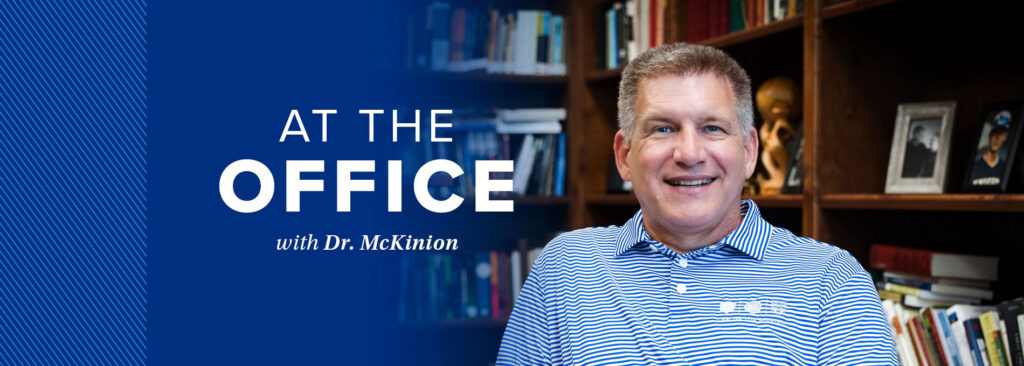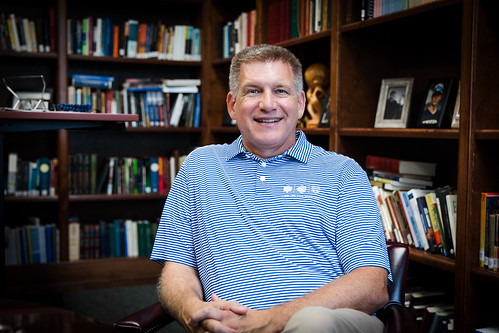At the Office with Dr. McKinion
Chad Burchett | January 04, 2024

As a pastor and professor, Steve McKinion is passionate about making disciples in the church and in the classroom. Drawn to the deep spirituality and Christ-centered confession of the church fathers, McKinion helps students drink deeply from the well of church history as they continue the Church’s mission to make disciples.
In the following Q&A, McKinion, professor of theology and patristic studies and John Leadley Dagg Chair of systematic theology, shares about his life, ministry, and early church research.
How do you like to spend time with your family?
We’re a sports family, so we like to watch sports and play sports. I’m an Ole Miss fan (Hotty Toddy). When our kids were little, we would watch them play or coach their teams. We’re also a big movie family. One of my recent favorites is “Top Gun: Maverick.”
Ginger and I also really enjoy going to rock concerts. We love 80s rock music. Some of our favorite concerts from the last several years have been the Eagles, Chicago, Foreigner, Journey, and Styx.
What hobbies do you enjoy outside the office?
Woodworking is my main escape. My dad was really into woodworking, so I had some background in it. Once our kids moved out of the house, I had more time to pick it up as a hobby again. I’ve enjoyed making furniture and little trinkets or gifts for people.
I also have an old truck that I like working on as well, which means I get to do some mechanic work from time to time. It was my grandfather’s truck, then passed down to my dad, then passed down to me. I enjoy doing things with my hands since my job is all about what I’m doing with my mind.
How did you meet your wife, Ginger?
We briefly met when she came with a friend to the church where I was serving. We just shook hands and said hello. It wasn’t until six weeks later that a mutual friend of ours basically set us up on a blind date. Our friend encouraged me to call Ginger and ask her out, so that’s exactly what I did.
We went out for the first time in April of 1994, and we were engaged by July of that year. In January of 1995, we got married in Mobile, Alabama. Then in August of that year, we moved to Scotland for three years during my doctoral studies. We’re now just a short way from our 30-year wedding anniversary.
What first drew you to study theology, and at what point in that journey did you decide to focus your research on patristics?
I knew I wanted to be better equipped to minister to the Church. I was serving as a youth minister at the time, and I knew I didn’t want to do that long term. I wanted to be best prepared for ministry, and I felt like theology was the better track at that time because it would offer me extensive textual and theological training.
I thought I was going to focus on Reformation studies, so I was reading about the Marburg Colloquy — this dispute between Martin Luther and Ulrich Zwingli where Zwingli accuses Luther of being an Apollinarian and Luther accuses Zwingli of being a Nestorian. I had very little knowledge of what those heresies were, so I started reading about them in the writings of the church fathers. When I started reading the fathers, I was hooked. I was drawn to the fathers because they were all about the Bible. As someone committed to the inspiration, authority, and sufficiency of God’s word, I was excited to find that they were committed to the same things.
As someone committed to the inspiration, authority, and sufficiency of God’s word, I was excited to find that they were committed to the same things.
Which early church father has influenced you the most? In what ways?
Most of my work has been on Cyril of Alexandria, a fifth century theologian. I first encountered his writings against Nestorius, and then realized Cyril had written a commentary on virtually every book of the Bible. In reading Cyril, I was drawn into the biblical text for spiritual formation and transformation of everyday life. His sermons and commentaries were written for the Church because Cyril was truly a pastor to people. As a pastor, I want to do the same thing that he did, teaching people the Bible and helping them become disciples of Jesus.
The church father that I’m most drawn to, however, is Irenaeus, a second century theologian, who wrote “Against the Heresies” and “Demonstration of the Apostolic Preaching.” I’ve been particularly impacted by Irenaeus’s way of reading the Bible. He was consumed with the biblical text, and while combatting the Gnostic heretics, he laid out a robustly Christian way of reading the Bible — in particular, the Old Testament. His Christian reading of the Old Testament helped me recognize the decidedly Christian way the New Testament writers read the Old Testament.
Irenaeus helped bring the whole Bible to life for me. He emphasized the Bible as the locus of God’s revelation to us and, at the same time, emphasized Christ as this recapitulated humanity — the Son of Man who is bringing redemption to all of humanity.
As a pastor, I want to do the same thing that he did, teaching people the Bible and helping them become disciples of Jesus.
What advice would you give students who want to start reading the early church for themselves? What works would you recommend first?
Start with the early church writers themselves and then explore secondary resources. The fathers are accessible and are often available in good translations. They are proclaiming the same gospel that you and I believe and preach every week.
I would recommend three primary texts to begin with: Irenaeus’s “Demonstration of the Apostolic Preaching,” then Athanasius’s “On the Incarnation,” and then Cyril’s “On the Unity of Christ.” These books weren’t written to be read as a series, but they really do tie well together. Irenaeus gives us this Christian way of reading the Bible that shows us the Old Testament is about Jesus. Athanasius helps us understand that Jesus is the location where God is present and humanity is present in fullness for the purpose of salvation. Lastly, Cyril explains for us both why it is important that Jesus is fully God and fully man and how this perfect union of God and man is the basis of our salvation in him.
My number one recommendation for a secondary text would be Robert Wilken’s book, “The Spirit of Early Christian Thought: Seeking the Face of God.” It’s an excellent companion to the church fathers.
What research or writing projects are you currently working on?
I have two books on Christology that I’m working on. One is a popular-level work and then one that is a more academic work that I hope to complete by the end of the year. I am also working on a one-volume systematic theology. I’ve been teaching systematic theology for 25 years now, and it has taken me 25 years to finally write it. It will be a dogmatics, and not your typical systematic theology. It will be structured around the holistic story of Scripture — the way I teach my theology courses.
What has God been teaching you in his word lately?
I think the one word that God brings to mind is patience. I’m generally not the most patient person, but the Bible has a lot to teach me about patience — in terms of both patience with God and patience with other people. First and Second Peter have been reminding me to be patient with God because he knows what he’s doing. His timing is not our timing. I am learning to be patient and trust him.
I am constantly reminded that when you’re impatient with others, it is hard to help shepherd them toward transformation in Christ. I am the preaching pastor at Woodland Baptist Church. I started as the interim pastor in 2021 and have been permanent in that role since November of 2022. So, it has been so important for me to learn patience in relationships — patience with fellow Christians but also with non-Christians who are hearing the gospel but have yet to accept it.
It is a joy to grow in ministry and serve the Church even while training others to do the same. It’s really difficult to train pastors and missionaries without having either some extensive ministry experience or some ongoing ministry investment.
Editor’s note: This article originally appeared in the fall 2023 issue of the Great Commission Magazine of Southeastern Baptist Theological Seminary.
